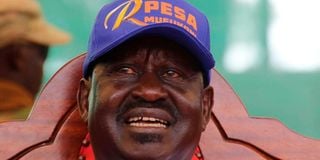Premium
Why Kenyans should vote against Raila Odinga

Azimio la Umoja presidential candidate Raila Odinga.
Irrational voting occurs when citizens lack sufficient knowledge about candidates. It happens when voters form political views on fabricated issues and believe that their individual votes are representative of like-minded voters. Irrational voting happens when voting choices are affected by irrelevant events.
Rational voting happens when voters have shown great consistency in their attitudes and choices. Voters' decisions are rational if their voting behaviour is based on (a) voters' intention, and if their intention is based on (b) voters' evaluations of the performance or capabilities of the candidate.
Rational voting
This article intends to illustrate how rational voting dictates that Kenyans should vote against Azimio presidential candidate Raila Odinga.
Mr Odinga has stated publicly that he intends to continue with President Uhuru Kenyatta's work. He is, therefore, a status-quo candidate. However, current macro-economic indicators look miserable and hence rational voting based on Kenyans' self-interests demands that Raila should be voted out as he promises the status quo. What are the current macro-economic indicators?
According to data published by the Kenya National Bureau of Statistics, the annual inflation rate in Kenya accelerated to 7.1 per cent in May 2022, from 6.5 per cent the previous month. It was the highest reading since February 2020, as the cost of food products continued to rise sharply (12.4 per cent vs 12.2 per cent in April).
Kenya’s credit rating is poor. Moody’s credit rating for Kenya was last set at B2 with a negative outlook. Fitch's credit rating for Kenya was last reported at B+ with negative outlook. Credit rating is used by sovereign wealth funds, pension funds and other investors to gauge the credit worthiness of Kenya, thus has a big impact on the country's borrowing costs. The CfC Stanbic Bank Purchasing Managers' Index measures the performance of agriculture, mining, manufacturing, services, construction and retail sectors and is derived from a survey of 400 companies.
The Stanbic Bank Kenya PMI fell to 48.2 in May from 49.5 the previous month. It shows a second consecutive month of contraction in the country's private sector and at a faster pace. The bank's report, which is available online, shows output and new orders fell further, mainly due to inflationary pressures, which impacted both operating costs and customer demand. Thus employment continued to decline. The report indicates business confidence dropped to a record low for the third straight month in May, amid increased uncertainty over supply chains, inflation and geopolitical tensions.
The Kenyan shilling
Another macro-economic measure is the Kenyan shilling. The Kenyan shilling has hit a record low of 117.01 against the dollar, showing a continued rally in prices of imported commodities like fuel and cooking oil.
The fall is attributed to increased demand for dollars from importers.
According to the Central Bank of Kenya, Kenya recorded a historic trade deficit in recent months. Kenya exports agricultural products, mainly horticulture and tea. The main export destinations are UK, Netherlands, Uganda, Tanzania, United States and Pakistan. Kenya imports mostly machinery and transportation equipment, petroleum products, motor vehicles, iron and steel. Kenya’s main import partners are India, China, UAE, Japan, Saudi Arabia and United States.
Given this dire economic situation, Kenyans need to vote rationally.
If Raila did not have the project tag, he would be competitive. But as someone promising to continue economic maladministration of the current regime, he ought to be voted out as a rational expression of dissatisfaction with the state of the economy.
Deputy President William Ruto promises something new. He promises to tackle inflation by addressing structural economic characteristics such as domestic production.
This is a good strategy, noting that Kenya’s inflation is largely ‘cost-push’. This form of inflation occurs when there is a supply shortage.
Cost-push inflation
Granted, supply-chain disruptions, like the one caused by the Covid-19 pandemic, partly led to cost-push inflation. But Kenya’s structural economic problems remain. For example, the Consumer Price Index (CPI), which covers food and rent, among other costs, soared this year. Ruto’s pledge to increase supply of public houses will deter rental increments. Monopolistic companies are contributors to cost-push inflation. That explains Ruto’s pledge to make the economy more competitive.
Government regulation and taxation can also reduce supplies. Ruto plans to deregulate the economy and hence attract investors who would help ease our import bill.
When a country lowers its currency exchange rates, it can create cost-push inflation in imports. That makes foreign goods more expensive compared to locally produced goods. The IMF reclassified Kenya’s shilling as a managed rather than a floating currency. An overvalued shilling makes Kenya’s exports uncompetitive. The current account deficit will remain until the Kenya shilling floats. Ruto pledges to adhere to international standards on currency management.
Ruto ideas would definitely help manage inflation and restore Kenya’s economic glory. Therefore, rational voters need to vote out Raila and support Ruto.
Dr Kang’ata teaches law at Catholic University of Eastern Africa and is the Murang’a senator. He is a former Senate Chief Whip.





